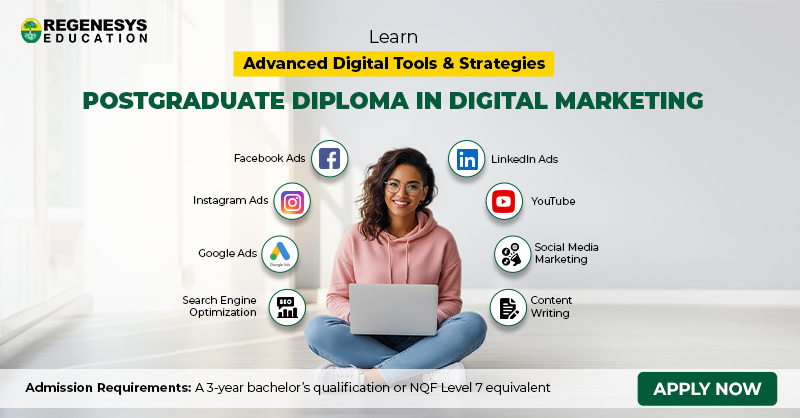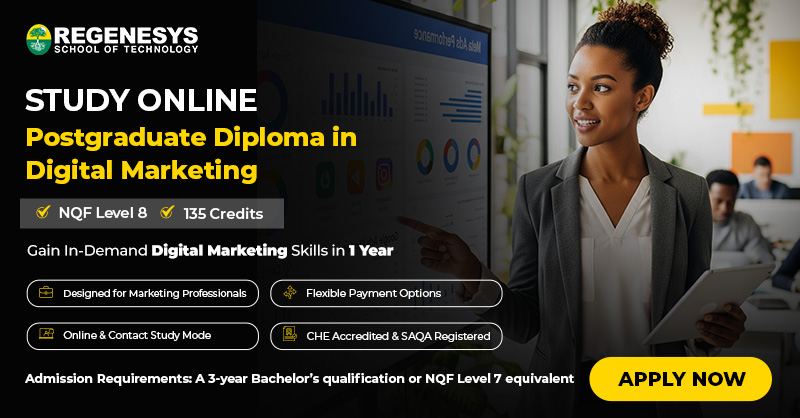Digital Marketing involves promoting products or services through digital channels such as search engines, social media, and email. With businesses increasingly shifting online, digital marketing professionals are in demand. From mastering content marketing to SEO and analytics, understanding the digital landscape is essential for career growth.
This article will cover what digital marketing is all about, including its types, strategies, benefits, practical applications, and career prospects.
Table of Contents
What Is Digital Marketing?
Digital marketing is the practice of promoting products, services, or brands through digital channels such as websites, social media, search engines, email, and mobile applications. It is a core part of the modern marketing ecosystem, enabling businesses to reach audiences at scale with precision and personalisation. But when people ask, what is digital marketing all about, the answer goes beyond online advertising – it is about creating meaningful engagement with consumers in a data-driven, measurable manner.
When considering what is digital marketing all about, it’s important to view it as an evolving discipline – one that equips professionals with versatile tools to connect, convert, and cultivate brand loyalty in a connected world. It includes both paid and organic approaches:
- Paid Digital Marketing involves advertising through platforms like Google Ads, Facebook Ads, LinkedIn Sponsored Posts, and influencer collaborations, where businesses pay to place their content before specific audiences.
- Organic Digital Marketing focuses on unpaid tactics such as search engine optimisation (SEO), social media content, and email newsletters that build audience engagement and visibility over time.
Digital marketing doesn’t replace traditional marketing but complements it. In fact, digital campaigns often integrate with offline strategies such as TV, print, and radio advertising to build a unified brand presence. As the digital economy grows, so does the importance of digital marketing in strategic business planning.

Some defining features that will allow individuals to better understand what is Digital Marketing all about:
- Measurability: Marketers can track user activity, engagement, and conversion rates in real-time.
- Targeted Reach: Businesses can tailor content based on user demographics, location, interests, and behaviours.
- Cost-Effectiveness: Digital platforms often provide better returns on investment compared to traditional media.
- Interactivity: Two-way communication allows for direct customer feedback and engagement.
- Automation: Tools such as CRMs and email platforms can automate personalised marketing campaigns.
- Scalability: Campaigns can reach local or global audiences with minimal geographical barriers.
Types of Digital Marketing
To understand what is digital marketing all about, it’s helpful to explore its various forms. Digital marketing consists of a range of approaches that work together to create awareness, generate leads, and increase conversions. Each type plays a specific role in a brand’s online visibility and consumer engagement.
Listed below are the major types of digital marketing:
- Search Engine Optimisation (SEO): The process of improving a website’s visibility on search engines like Google. It involves keyword research, content optimisation, technical enhancements, and backlink building.
- Content Marketing: Creating and distributing valuable content – such as blogs, eBooks, videos, and infographics – to attract and engage a target audience.
- Social Media Marketing (SMM): Promoting products or services through platforms like Facebook, Instagram, LinkedIn, and Twitter. This includes both organic content and paid social media advertising.
- Pay-Per-Click Advertising (PPC): A paid model where advertisers pay a fee each time their ad is clicked. Google Ads is one of the most widely used PPC platforms.
- Email Marketing: Sending direct emails to potential or current customers with the aim of building relationships, promoting offers, or encouraging repeat business.
- Affiliate Marketing: A performance-based marketing model where businesses reward external partners (affiliates) for generating traffic or sales.
- Influencer Marketing: Partnering with influential individuals who promote a brand to their followers on platforms such as Instagram, YouTube, or TikTok.
- Mobile Marketing: Targeting users on mobile devices via SMS, app notifications, or mobile-optimised websites.
- Video Marketing: Using videos to promote or explain a product or service, commonly shared on YouTube, Instagram Reels, or TikTok.
- Online Public Relations: Managing a brand’s online reputation through digital press releases, blogger outreach, and customer reviews.
Read more on How To Do Social Media Marketing? Techniques, Tools, and Tactics That Work
Digital Marketing Strategy: The Pillars
To better understand what is digital marketing, one must understand how strategy shapes success. A digital marketing strategy is a comprehensive plan that outlines how a brand will use digital channels to reach its objectives. It includes both long-term goals and short-term actions, all aligned to drive brand awareness, customer engagement, and revenue.
Effective digital marketing strategies are data-informed, iterative, and aligned with broader business objectives. Rather than relying on one tactic, they integrate multiple channels and optimise performance through continuous testing and refinement.
The core pillars that will help us better understand what is Digital Marketing all about are listed below:
- Audience Analysis: Understanding who your customers are, what they value, and how they behave online.
- Platform Selection: Choosing the right mix of online channels – such as social media, email, search engines, and websites – based on where the target audience is most active.
- Content Planning: Creating content that is relevant, engaging, and tailored to various stages of the customer journey, from awareness to conversion.
- SEO & SEM: Ensuring your content ranks on search engines organically (SEO) and gains immediate visibility through paid ads (Search Engine Marketing).
- Performance Analytics: Using tools like Google Analytics or marketing dashboards to measure campaign success, understand user behaviour, and refine strategies.
Read more on How to Market Your Business on Social Media: A Strategic Guide for 2025
Benefits of Digital Marketing
One of the most important reasons to understand what is digital marketing all about is its significant advantages over traditional marketing methods. As businesses increasingly shift towards online platforms, the ability to reach, influence, and convert audiences through digital means has become indispensable.
Below are some of the primary benefits of digital marketing:
- Global Reach: Reach audiences across the globe, allowing businesses to enter new markets without the need for a physical presence.
- Targeted Campaigns: Deliver personalised content by targeting users based on demographics, location, interests, and online behaviour.
- Real-Time Analytics: Monitor campaign performance instantly and make data-informed decisions to improve results continuously.
- Cost Efficiency: Achieve substantial reach and impact at a fraction of the cost of traditional advertising methods.
- Brand Development: Strengthen your brand through consistent messaging, quality content, and active engagement on digital platforms.
- Higher Conversion Rates: Increase customer actions by using remarketing strategies, A/B testing, and user journey insights.

How Digital Marketing Works in Practice?
Digital marketing operates through a combination of strategic planning, targeted execution, and ongoing analysis. When we discuss what is Digital Marketing all about, at its core, it involves using various online channels and tools to connect with potential customers and communicate value.
The goal is to encourage desired actions such as purchases, sign-ups, or inquiries. Below is an overview of the practical steps involved:
- Strategy Development: Set clear goals, identify target audiences, and choose digital channels with measurable KPIs.
- Content Creation: Produce relevant and engaging content such as blogs, videos, emails, and ads tailored to audience’s needs.
- Channel Selection & Execution: Launch campaigns on platforms like Google, social media, and email with targeted messaging.
- Audience Targeting: Use data to focus campaigns on specific demographics, interests, locations, and behaviours.
- Tracking & Analytics: Monitor key metrics like traffic, clicks, and conversions to evaluate campaign performance.
- Continuous Optimisation: Adjust strategies and content based on data insights to improve results over time.
- Engagement & Relationship Building: Maintain customer interaction through personalised communication and follow-ups.
Read more on
The Future of Digital Marketing
Digital marketing continues to evolve rapidly, shaped by advancements in technology, changing consumer behaviour, and emerging trends. As businesses adapt to this dynamic landscape, several key developments are expected to define the future of digital marketing.
For professionals seeking to build a future-proof career, formal education remains crucial. The Postgraduate Diploma in Digital Marketing from Regenesys is designed to prepare learners for these emerging trends through practical modules in content strategy, digital analytics, and innovation.
Listed below are some emerging trends that will help to define what is digital marketing all about in the future:
- AI will increasingly automate campaigns and personalise customer experiences through advanced data analysis.
- Data privacy and security will become central, with marketers focusing on transparent, consent-based practices.
- Voice and visual search technologies will reshape SEO strategies to accommodate new ways users find information.
- Interactive and immersive content, including AR and VR, will create deeper customer engagement.
- Omnichannel marketing will integrate multiple platforms for a seamless and consistent brand experience.
- Short-form video content will dominate as consumers prefer quick, engaging formats on social media.
- Predictive analytics will help marketers anticipate customer needs and improve campaign effectiveness.
- Sustainability and ethical marketing will grow in importance as consumers favour socially responsible brands.

Conclusion
So, what is digital marketing all about? It’s about understanding how to use digital platforms to create meaningful customer relationships. With the growing demand for skilled professionals, there has never been a better time to enter this field.
Regenesys Business School offers a well-structured Postgraduate Diploma in Digital Marketing, equipping you with the tools to succeed in today’s digital economy. From mastering campaign strategies to understanding analytics, this programme bridges academic knowledge with real-world application.
If you are ready to become a part of the future of marketing, visit the Regenesys website today to enrol for the programme.
What is Digital Marketing All About? – FAQs
Where can I study Digital Marketing?
Interested professionals can enrol for the accredited Postgraduate Diploma in Digital Marketing offered by Regenesys Business School.
What is digital marketing all about?
Digital marketing involves promoting products or services using online channels such as websites, search engines, social media, email, and mobile apps.
Why is digital marketing important today?
It allows businesses to reach targeted audiences globally, track campaign performance in real time, and achieve higher returns at lower costs than traditional marketing.
What are the main types of digital marketing?
The main types include SEO, content marketing, social media marketing, PPC advertising, email marketing, influencer marketing, and video marketing.
How does digital marketing differ from traditional marketing?
Digital marketing is data-driven, interactive, and scalable, whereas traditional marketing relies on offline channels like TV and print with limited measurability.






